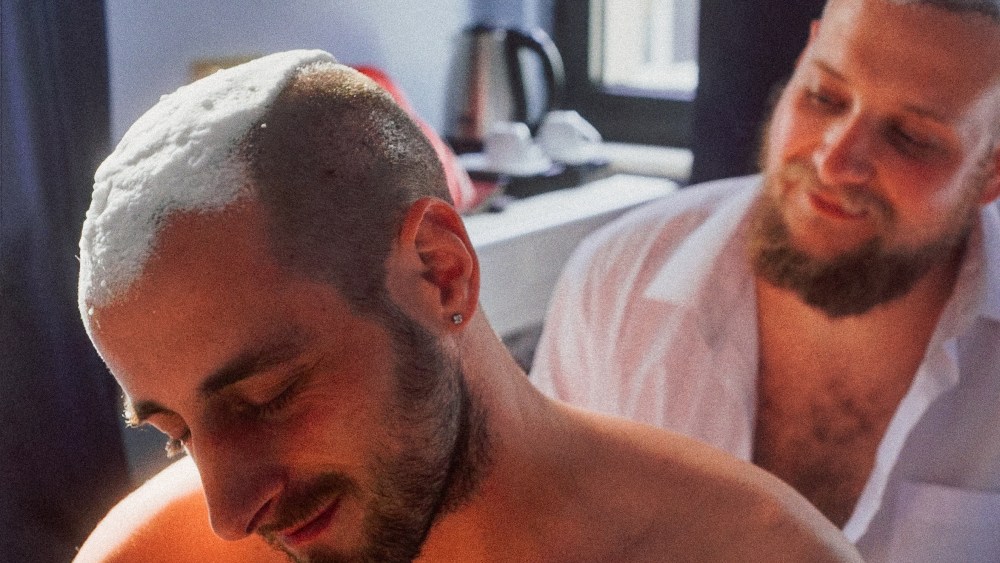To anyone who has lately travelled to Istanbul, it’s a familiar if disconcerting sight. Hordes of men strolling nonchalantly around the city’s tourist spots with their bare scalps stippled, bloodied and sometimes bandaged — survivors not of a recent zombie apocalypse but any of Turkey’s famously affordable hair transplant clinics. Jokes at their expense are easy and cheap, though each of these ruddy head wounds caps an individual story of insecurity and frail hope for more abundant days ahead. Two of those are told, with tact and care and just a little absurdist wit, in Belgian director Manoël Dupont’s delicate miniature “Before/After,” a film that treats the hair transplant industry with respectful, even journalistic interest, but not as the cure-all that the protagonists would like to believe it is.
A standout in this year’s Proxima competition at Karlovy Vary, where it received a special mention from the jury, “Before/After” is a brief, unassuming character study with a novel semi-documentary hook: Though the film is mostly scripted fiction, its leads are two non-professional actors undergoing hair transplant surgery themselves, and the procedures and transformations depicted on screen are their own. That lends proceedings a bracing, candid authenticity, as well as unusually heightened human stakes — the anxieties shown at all stages of the process here are real.
That the film is also a gentle, sensitive portrayal of a fledgling gay relationship could see it gain traction on the LGBT fest and distribution circuit — it was picked up last month by queer-oriented French sales outfit Outplay Films — though its articulation of vulnerable modern masculinity is broadly resonant.
Late one night, Jérémy (Jérémy Lamblot) and Baptiste (Baptiste Leclere) meet by chance on the road: The former, hitching a ride home, is picked up by the latter, who’s been living in his car for some time. Small talk leads to a drink at the large house Jérémy has inherited from his late father. There’s an evident shy attraction between the two, but the two men, both nearing 30, bond first and foremost over their mutual male pattern baldness. Baptiste, tall and heavy, attempts to compensate for it with straggly shoulder-length locks; the more diminutive Jérémy gestures toward his relative youth with diamond stud earrings. Dupont’s writing, crisp and compact and scant on backstory, alludes to deeper damage in each man than their respective thinning pates — though hair, at least, is one lost thing they feel they can regain.
With one swift cut we’re in Istanbul, where Jérémy and Baptiste have booked a cheap hotel room and a series of consultation appointments with hair clinics. It’s not clear quite how much time has passed, though the pair, intimate if not exactly a couple, don’t yet seem to know each other all that well — the shared ritual of a hair transplant beckons as a gateway to a new life for both. Their concerns look small in a Turkey caught up in 2023’s landmark presidential elections: Shooting on the fly on crowded city streets, Dupont and DP Thibaut Egler capture a sense of communal restlessness that chimes, in its own way, with our protagonists’ nerves and impatience for a new chapter. Partially if not completely playing themselves in curious circumstances, Lamblot and Leclere give lovely, quietly yearning performances, regarding each other with a mixture of timidity and frank need.
The operation, meanwhile, is observed in methodical detail both morbid and tender, as we’re party to the stress of language barriers at crucial points of communication, last-minute jitters over newly drawn hairlines, and the panic of separation when they finally go under the scalpel. Togetherness is important to the men in this moment — “If we end up with shitty hair, we’ll both be in the same boat,” they agree, oddly romantically — though what lies ahead for them is uncertain. “A page is turned, I can become a new man,” says Jérémy immediately after the operation, while later, he and Baptiste lie nude together, holding each other as mirrors to their supposedly rejuvenated masculine mojo. A gracefully ambiguous final act, however, invites the question of how different you can feel for how long, before you need to do some less cosmetic work on yourself.
